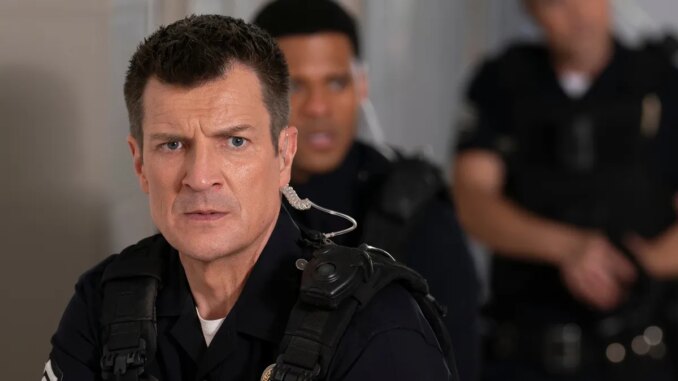
From Badge to Beanie: Inside "The Rookie" Season 8 and the Maple Leaf Surprise: The Canadian Series You Didn't See Coming
"The Rookie" has always been a show about reinvention. John Nolan, the middle-aged divorcé turned LAPD officer, embodies the idea that second chances are possible, even in the high-stakes world of law enforcement. Season 8, however, takes this theme to a whole new level, forcing viewers to confront the inevitability of change and the bittersweet reality of saying goodbye. Simultaneously, across the border in Canada, a low-budget, offbeat comedy about competitive curling was quietly gaining a cult following, proving that sometimes the most unexpected shows can strike a chord with audiences hungry for something fresh. This essay will delve into the complexities of "The Rookie" Season 8, exploring its thematic depth and character arcs, and contrast it with the burgeoning success of the surprising Canadian series, highlighting the diverse landscape of modern television.
"The Rookie" Season 8 opens with a palpable shift. Nolan, no longer the wide-eyed rookie, is now Sergeant Nolan, training a new crop of fresh-faced officers. The show cleverly leverages this generational shift, mirroring Nolan’s own journey through the experiences of his recruits. We see echoes of his naiveté in the earnestness of Officer Maya Perez, a tech-savvy prodigy struggling to balance her idealism with the harsh realities of street policing. Meanwhile, Officer David Lee, a former football star, grapples with the pressure of living up to his athletic legacy while battling the ethical compromises that often plague the job. These characters, while familiar in their archetypes, are given nuanced backstories and compelling internal conflicts, allowing for a deeper exploration of the show's central themes.
The core of Season 8, however, lies in the looming retirement of Sergeant Grey. His decision to step down forces Nolan and the rest of the precinct to confront the void he will leave. The writers handle this transition with remarkable sensitivity, portraying Grey not as a caricature of a grumpy old cop, but as a man wrestling with his own mortality and the legacy he leaves behind. The season is punctuated with flashbacks to Grey’s early days on the force, offering a glimpse into the events that shaped his character and his commitment to justice. These moments, coupled with his heartfelt farewell speech to the precinct, solidify Grey as more than just a superior officer; he becomes a father figure, a mentor, and a symbol of unwavering integrity.
Beyond the individual character arcs, Season 8 also tackles timely and relevant social issues. The show confronts systemic racism within the police force, forcing Nolan and his colleagues to examine their own biases and privileges. A particularly impactful storyline involves a series of racially motivated incidents within the precinct, prompting a difficult but necessary dialogue about accountability and reform. While some critics argued that the show sometimes veered into preachy territory, its willingness to engage with these complex issues felt genuine and ultimately contributed to the overall narrative.
While "The Rookie" Season 8 grapples with weighty themes and character transitions in the sun-drenched landscape of Los Angeles, a completely different story was unfolding in the icy arenas of small-town Canada. "Stone Cold Serious," a mockumentary-style comedy about a ragtag curling team, was initially dismissed as niche and overly Canadian. However, its quirky humor, endearing characters, and surprisingly compelling storylines began to resonate with audiences online.
"Stone Cold Serious" follows the fortunes (or misfortunes) of the "Maple Leafs," a team of four underdogs from a rural Manitoba town, as they attempt to qualify for the national curling championships. Led by the perpetually optimistic but perpetually losing skip, Barry "The Broom" Buchanan, the team is a collection of lovable eccentrics. There's Brenda, the fiercely competitive third, whose fiery temper often gets her into trouble; Darryl, the quiet and unassuming second, who secretly harbors dreams of becoming a world-renowned curler; and Agnes, the team's anchor, who is more interested in crocheting and gossip than winning.
What made "Stone Cold Serious" so appealing was its authentic portrayal of small-town life and its embrace of the absurd. The show poked fun at Canadian stereotypes without resorting to cheap jokes, and its characters were so realistically flawed and relatable that viewers couldn't help but root for them. The curling matches, while often chaotic and hilariously inept, were surprisingly suspenseful, and the show managed to capture the camaraderie and passion that drive amateur athletes.
The success of "Stone Cold Serious" highlights the importance of taking risks and embracing originality in the television industry. In a landscape dominated by big-budget dramas and formulaic sitcoms, this low-budget Canadian comedy proved that there's still an appetite for something different. Its popularity also speaks to the power of word-of-mouth and online communities, which allowed the show to find its audience despite limited marketing and distribution.
In conclusion, "The Rookie" Season 8 offers a poignant exploration of change, legacy, and the enduring power of human connection. Its thoughtful handling of character transitions and its willingness to engage with complex social issues make it a compelling and relevant piece of television. Meanwhile, the unexpected success of "Stone Cold Serious" demonstrates that sometimes the most surprising shows can resonate with audiences when they offer something genuine, quirky, and undeniably entertaining. Both series, in their own unique ways, reflect the evolving landscape of television and the diverse stories that are waiting to be told. One, a well-established procedural drama, continues to evolve and push boundaries, while the other, a humble Canadian comedy, proves that sometimes the underdog can win the day, even if it's just on the ice.